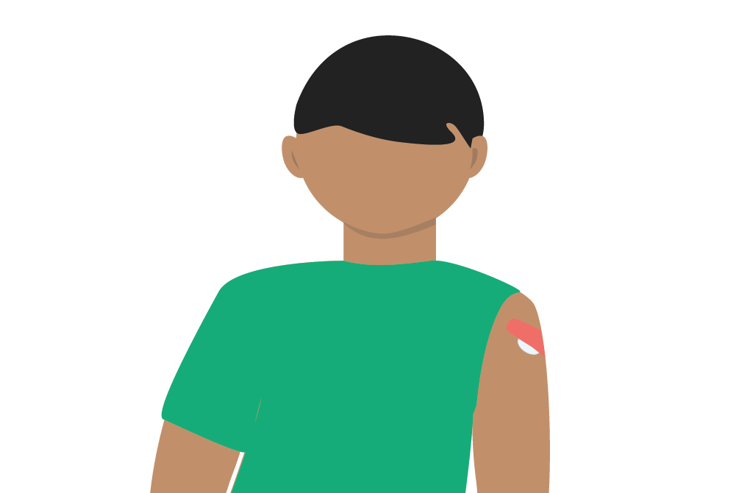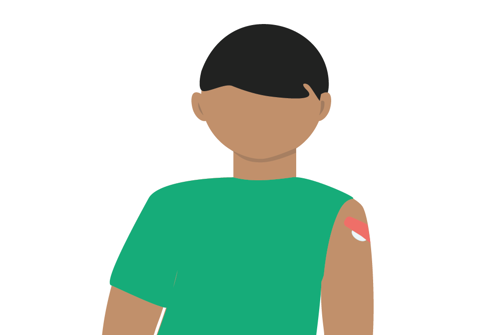Young people and vaccine against meningococcal disease
Article
|Updated
The Norwegian Institute of Public Health recommends that young people aged 16-19 should consider vaccination against meningococcal disease (infectious meningitis).
Vaccine recommendations to young people
The number of cases of meningococcal disease in Norway is low, but young people aged 16–19 ears have a higher risk of infection compared to the rest of the population. Many young people gathered close together, partying, high alcohol intake or use of other drugs, sharing bottles, glasses and cigarettes, combined with little sleep can increase the risk of infection and a severe disease course - both in Norway and abroad. Vaccination in advance of graduation celebrations (russ), trips, festivals, sports gatherings and youth camps may be relevant.
The recommendation also applies to other age groups who participate in similar activities.
Healthy young people carry meningococci in their throats more often than others. Although very few of these young people become ill, they can infect others. The disease often progresses rapidly, and around 10 per cent of those who contract the disease die.
Over the last ten years, between one and five cases of meningococcal disease have been reported per year in this age group.
About the disease and vaccines
There are two different types of vaccines:
- Combination vaccine against meningococcal serogroups A, C, W and Y (Menveo, Nimenrix or MenQuadfi) protects against all four groups of meningococcal bacteria.
- In addition, a vaccine against meningococcal serogroup B (Bexsero or Trumenba) is available.
In recent years, serogroup Y has accounted for most of the cases among young people, although there have been a few cases with serogroup W and C. Until 2023, there had been no cases caused by serogroup B among young people aged 16-19 in Norway since 2014, although serogroup B is in circulation among other age groups in the population.
By mid-October 2023, three cases of serogroup B among teenagers have been reported, of which two cases were among 16-19-year-olds.
Based on the current infection situation, the ACWY vaccine will provide the widest coverage in the 16-19 age group. Therefore, this vaccine is primarily recommended for young people. To be protected against all groups of the meningococcal bacteria that have caused disease in Norway in recent years (A, B, C, W and Y) you must be vaccinated with both types of vaccine. The infection situation can change, and the incidence of the various serogroups can be difficult to predict. The Norwegian Institute of Public Health is closely monitoring the trend and the vaccination advice may be updated.
The incidence of the various serogroups may differ between countries. When travelling to countries outside the Nordic region that have an increased risk of infection with the meningococcal bacteria, for example on trips that include parties and close contact with other young people over several days, the need for meningococcal B vaccination should be carefully assessed. Some countries and educational institutions abroad may require or strongly recommend vaccination against meningococcal disease; ACWY vaccine, meningococcal B vaccine or both. It is therefore important that students/ pupils who are going to study abroad should check the guidelines for the relevant educational institution.
Vaccinate in good time
The vaccines should be given well before graduation celebrations or other similar activity begin. Vaccination against meningococci A, C, W and Y consists of one dose. Vaccination against meningococcus B consists of two doses, taken at least 1 or 6 months apart, depending on the vaccine used. After vaccination, it takes approximately two weeks before the vaccines provide protection. Meningococcal vaccines provide protection for approximately 5 years (approximately 10 years for Nimenrix).
The vaccine used will depend on current availability.
Price
Both the vaccine and vaccination must be paid for by the individual themselves (in the same way as other vaccines that are not offered in the childhood immunisation programme), but some municipalities and counties have chosen to offer free vaccination to young people.
The ACWY vaccine costs just under NOK 400 (you need one dose), while the B vaccine costs just under NOK 1,000 per dose (you need two doses to be fully vaccinated). There is also a charge to be given the vaccine(s), but this depends on where you are vaccinated.
The vaccines can be given by a family doctor, at a vaccination clinic, or via the school health service in municipalities that offer this service.
Other preventive measures
Follow this advice to reduce the risk of transmission:
- Avoid droplet infection, do not drink from the same bottle/can/glass as others and do not share cigarettes.
- Remember that sore mucous membranes are more susceptible to infections. Take care of your voice and throat and avoid excessive shouting. Avoid snus and smoking (both active and passive).
- Catch up on your sleep, your body needs rest.
- Avoid too much alcohol and use of drugs. When you are intoxicated, your judgment will be impaired, and symptoms of meningococcal disease can be mistaken for being drunk.
- Seek medical attention if you suspect a friend may be ill. Take care of them if they are drowsy (reduced consciousness) or have a fever.

